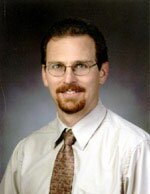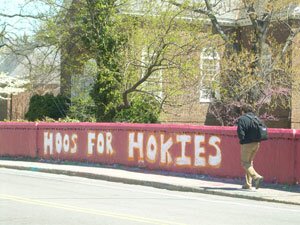ESSAY- Unrivalled: Why we're all Hokies now
Before an apparently isolated, mentally ill gunman slaughtered 32 students and professors on April 16, the big Hokie-'Hoo issue was barely worth crowing about. In late March, a fiberglass Tech rooster mascot was allegedly stolen from downtown Blacksburg by eight to 10 UVA fraternity pledges as part of the famous rivalry between the two schools.
That "Farmer Hokie" statue recalls a UVA bumper sticker from the 1980s that read, "All dirt roads lead to Virginia Tech"– a reference to Tech's origin as a Land Grant University, established by the government in 1872 to provide affordable higher education for the masses. Land grant schools had their roots in agriculture and the "mechanical arts"– Tech was originally called the "Virginia Agricultural and Mechanical College"– hence the dirt-road dig. These days, however, only high-tech highways lead to the school.
Indeed, recent stories about the victims of last week's rampage paint a picture of a university that now attracts some of the best and brightest faculty and students from around the world for top programs not only in engineering but in a wide array of liberal arts courses.
In addition to the heralded sports rivalry, the connections between UVA and Virginia Tech are numerous, as UVA president John Casteen pointed out the evening after the tragedy. "Many of us have parents, daughters and sons, sisters and brothers, and friends who study, teach, or work in Blacksburg," he said. "Many of us are Tech alumni."
But even those who had no previous connection to anyone at the school may feel like they knew Ryan "Stack" Clark, an affable leader in the Marching Virginians, Tech's marching band. His triple major in psychology, biology, and English made Clark something of a Renaissance man; his rush to aid a fellow student in the West Ambler Johnston residence hall made him something of a hero.
The death of Liviu Librescu seems especially poignant. The 76-year-old professor survived the Holocaust in his native Romania, and then, in the last moments of his life, saved the lives of many of his students by holding his second-floor classroom door shut against the killer so they could escape.
But if one stops to consider any one of the victims– whose sheer diversity reveals the school's world-wide appeal– the magnitude of the loss is hard to comprehend. The dead include Juan Ramón Ortiz-Ortiz, a civil engineering grad student from Puerto Rico; postgrad Waleed Mohamed Shaalan of Egypt; Henry Lee, who emigrated to the U.S. from Vietnam in 1994, and Peruvian Daniel Alejandro Pérez Cueva. The list goes on and, heartbreakingly, on.
For many in Charlottesville, however, one name stands out as a personal loss: Kevin Granata, a 46-year-old biomechanical researcher who, from 1997-2002 worked at the Kluge Children's Rehabilitation Center and lived on Tilman Road in Ivy.
Granata was regarded by his peers as one of the top-five biomechanical researchers in the nation, a man who had impressed colleagues, students, and friends with his work ethic, athleticism, and kindness.
"One of the smartest people you'd ever meet," says Margaret Gorman, who knew Granata before he left Charlottesville for Blacksburg to continue his research on cerebral palsy. She first met Granata's wife, Linda, through Cub Scouts when both had children at Meriwether Lewis elementary school. It wasn't long before Gorman got to know the whole family– including the couple's three children, Alex, 13, Eric, 12, and Ellen, 11.
The families socialized frequently, and Gorman says the Granatas were devoted parents who were a regular presence at their children's school and extracurricular events. In addition to keeping the kids busy, they taught them responsibility and kept a neat house and yard, Gorman says, with one notable exception: a rusted pick-up sitting out front.
Gorman asked Linda why they kept it. Again, the children were their driving force– this time literally.
"That's Kevin's," Linda explained. "He's going to fix it up for Alex when he learns to drive."
UVA women's rowing coach Kevin Sauer reconnected with Granata more than 15 years after he'd coached him on the Purdue club rowing team when they both moved to Charlottesville.
"He saw my name somewhere, called me, we went to lunch a couple of times," Sauer recalls. "It was good to rekindle the days from 15 or 16 years earlier." Sauer says Granata was interested in the relationship between fatigue and back pain. Since rowing works– and tires– the back, Sauer and Granata discussed collaborating on research. "I'd fatigue the backs," Sauer says, "and he'd do the research." They never began the project, and now, Sauer sadly says, "we won't."
When Sauer heard that Granata was one of Monday's victims, he was shocked, he says– but not by the story of how Granata died. Having harbored students in his locked third-floor office in Norris Hall, he went downstairs to help out.
"If he'd stayed in his office, he would have been fine," says Sauer. But racing to the aid of others came naturally to Granata. "That's exactly the type of guy he was."
Gorman says she and her children had visited the Granatas several times since their move to Blacksburg. Last summer, Gorman's son Patrick attended Camp Powhatan, a Boy Scout camp, with Alex Granata. On Friday, April 20, she and Patrick returned to Blacksburg– only this time for Granata's memorial service. "It was standing room only," she says.
As family, friends, and students shared memories of Granata as a college football player, a triathlete, and a devoted dad, Gorman says, she was particularly touched just to hear the greeting Granata spoke to anyone who entered his office: "How can I help you?" She admits it was a straightforward question. "But that's what he was about," she says.

Professor Granata
VA TECH PHOTO

"Hoos for Hokies" has been the message of Beta Bridge since the day of the disaster.
PHOTO BY LUCIE STONE
#